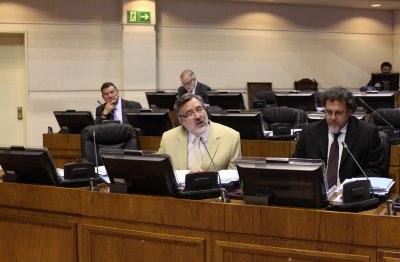
In a column published in El Mostrador digital newspaper, where Senator Alejandro Guillier usually shares his opinions, the president of the Mining and Energy Commission of the Senate made a call to improve technology, create synergies and to search for a strategic focus on the future of lithium.
El Mostrador
13-10-2014
Alejandro Guillier: Chile behind Lithium
The National Commission for Lithium, appointed by president Bachelet, gave a presentation to the Senate’s Mining and Energy Commission to inform on the development of discussions in relation to a national policy for the exploitation of this resource. As ministry Aurora Williams stated, this proposal is expected to “consider an efficient, yet effective and diversified production that allows an optimum profitability to our country.”
As we know, the Chilean salt fields (31%) and Bolivian ones (34%) hold 65% of the global reserves of this non-metallic mineral. The global production ascends to 155,000 tons of lithium carbonate, and Chile contributes 70,000 tons a year. Only 10 companies control the lithium market in the world and SQM, who holds 24%, is the largest producer in the world. In turn, the Chilean Lithium Society holds 17%. There is good news: in 2013, a ton of this resource was traded in USD 6,000, 3 times more than the 2,000 dollar price of the year 2000.
In the work of this Commission we see an excellent opportunity to promote a virtuous equation between natural resources, science, technology and innovation. Applied knowledge, combined with a partnership process between the State and private entities, including foreign investment, could articulate a sustainable control policy for this resource. However, and most importantly, it offers the opportunity to make a significant change to the extractive rentier model that has prevailed in the Chilean mining industry. Chile has few “world class” resources. Copper, lithium and molybdenum are some of them. We should create a strategic focus with a future vision that exceeds the cycle of one government and that supports lithium industry global development, with a projection for the next 20 or 30 years.
There are two ideas up for debate: first, to reinforce the work that has been developed in the Lithium Innovation Center (CNL, for its Spanish acronym), a section of Universidad de Chile where, since 2010, with limited financial resources and little support from the State, there has been an interesting focus on industrial applied research and cutting-edge technology; in particular, in the field of electro-mobility, which can be used as an oil alternative (gasoline and diesel). With this technology, we could work on a pilot project in an intermediate city in the north of Chile. Secondly, I cannot stop mentioning the virtuous articulation that we should boost between solar energy development and lithium, a synergy or dialogue I am not seeing between the different Ministries, State agencies, research centers, international partnerships and business associations from our country.
With a deadline set forth for the end of November, whatever the Lithium commission resolves will be a strong sign about the “new deal” that we want to define for the future exploitation of the natural resources of every Chilean. This includes the strategic role we assign to the State; the conditions – beyond simple and pure exploitation of this resource – we consider selecting strategic partners; a bet for ventures that have added value, technological innovation, and global value chains.
*Senator, President of the Mining and Energy Commission of the Senate
Source: http://www.elmostrador.cl/opinion/2014/10/13/chile-apuesta-por-el-litio/


